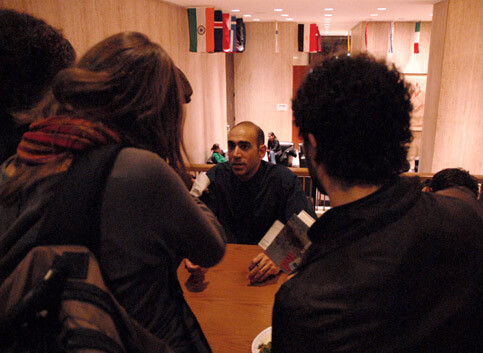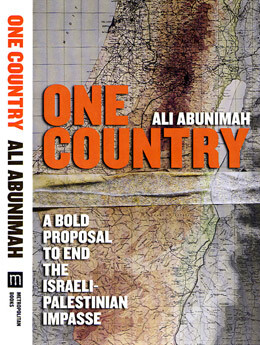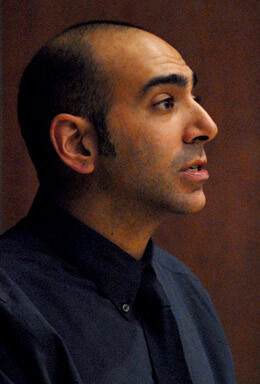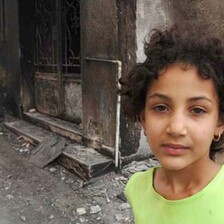The Electronic Intifada 14 December 2006

Ali Abunimah signs copies of One Country at Columbia University (nigelparry.net)
Electronic Intifada co-founder Ali Abunimah has long presented insightful analysis, monitoring and reporting on the deteriorating conditions in Palestine. In his new book, One Country, Abunimah presents his vision for a solution not based on partition rather equal rights and a dignified existence for all its citizens.
Abunimah travels often to the Middle East and is a full-time researcher in social policy at the University of Chicago. Christopher Brown spoke with Abunimah on the telephone earlier this month as he toured the United States promoting his book One Country.

Ali Abunimah: The situation in Gaza is very similar to what it has been for many years and worsening consistently; there’s a million-and-a-half people in Gaza; a permanent Israeli siege by land, sea and air under frequent bombardment; since early summer, more than [400] Palestinians have been killed in Gaza by the Israelis; several thousand injured, most of them civilians; the vast majority of people in Gaza now have difficulty feeding their families due to the Israeli siege which prevents food and other basic essentials from coming in.
In June, Israel bombed the only power plant in Gaza, so much of Gaza is without electricity on a consistent basis and is expected to remain so for the foreseeable future since no serious rebuilding is being done. It’s a very severe situation where daily life is characterized by poverty, a struggle to survive and random violence, which claims many innocent lives.
CB: The message recently delivered to Condoleezza Rice by Israeli officials is that the humanitarian and economic disaster befalling Gaza has a single, reversible cause; the capture of Israeli soldier, Gilad Shalit, in late June. Is the capture of Shalit where this narrative began?
AA: Let’s assume that what the Israelis are saying is true and that they are imposing this siege because of the capture of the Israeli soldier. If that is true then they are admitting to the most serious war crimes that can be committed under international law because the Geneva Convention makes it very clear that it is a serious crime to punish a civilian population for political reasons. Here Israel says they are punishing the civilian population in order to secure the release of a prisoner of war.
This is one of the most serious crimes against the laws of war, and against the Geneva Convention: terrorizing, starving, bombing a civilian population in order to achieve a military or political objective. I think that, if nothing else, should alert people to the true nature of this regime.
CB: Recently, the San Francisco Chronicle stated that if elections were held today, Hamas would only garner 21.9 percent of the vote. Secretary of State Rice said that she is in a “very concerned” state for the Palestinians. She went on to state that “the Palestinians need a government that can provide for their needs and meet the conditions of the Quartet.” She also added that she wanted to strengthen the “moderates” like Abbas. What is meant by these pronouncements?
AA: Well, if Condoleezza Rice was concerned about the Palestinian people, she wouldn’t be an active participant in starving them to death. And she would speak against Israel using American weapons to attack and besiege and harm civilians. She doesn’t care about the Palestinian people and she never has.
What she means by strengthening moderates is strengthening U.S clients and quislings. I use very strong language advisedly. But her notion of Palestinian moderates is a client regime, like the one in Iraq, totally dependent on U.S. and Israeli power and good will, like the government in Lebanon — one which is there to do the bidding of the United States and Israel from inside.
The United States is actively arming private militias of Mahmoud Abbas and other Fatah leaders who were defeated in the elections last January. The U.S. has been giving them millions of dollars, weapons training, and fomenting Palestinian civil strife and civil war. This is the U.S. anti-democratic policy, because what happened in the occupied territories is that Hamas won a democratic election fair and square. And since then, the United States, Israel and a small minority of Palestinians colluding with them have been trying to overthrow the results of the democratic election. This is what we are seeing in Palestine and this is United States policy.
CB: For 34 days the Israeli military bombarded Lebanon from the air, land and sea. Towards the end of the war, Israel flooded the southern landscape with cluster bombs. It is estimated that it will take at least a year to remove all cluster bombs that are currently injuring 13 people per day, many of whom are children. An unnamed officer in the Israeli military said that the use of the cluster bombs was “madness.”
As a result of cluster bombs being used, the accusations of white phosphorus, and the intentional bombing of hospitals and schools, will there be any chance for a complete and comprehensive investigation into war crimes?
AA: Well you know, Israel commits crimes on a daily basis and has been doing so for many decades. Many of these crimes have been documented by the United Nations. In the past, the UN Security Council would even condemn them.
Human rights groups have documented crimes in the recent Lebanon war and in Gaza. But never has Israel been held accountable. We’ve been hearing now for years about a UN investigation about the assassination of the former Lebanese Prime Minister Rafik Hariri. Has there ever been an investigation into Israel’s actions?
People say it’s controversial. The Israelis claim that Hizbollah was firing from civilian areas, which justified, in Israel’s view, the carpet-bombing of entire neighborhoods in Beirut. But nobody saw any evidence of that. None of the international groups that looked into it found any evidence of that. Israel didn’t present any evidence. But let’s say there’s a controversy about it; why can’t we have a UN investigation? Why are Israel’s crimes always off limits?
And what’s worse is the active collusion. Israel couldn’t do this, as a small country, … without the active collusion of Western regimes. And it’s not just the United States, it’s also the European Union, which is bankrolling Israel, providing weapons, and refusing to stand up.
The whole world is in an outcry over what’s happening in Sudan; the whole world is talking about holding North Korea accountable. Israel has nuclear weapons, Israel tested a nuclear weapon in 1979, Israel continues to export weapons all over the world, Israel is continuing to carry out serious war crimes in the Middle East and never have we heard any accountability for it. What is it about Israel that makes it exempt from any of the standards that are supposed to apply to the rest of us?

Ali Abunimah reads from his book at Columbia Law School (nigelparry.net)
AA: Well, there were reports about that. It was clear the U.S. supported the Israeli war in Lebanon on the basis that … the U.S. was using Israel to destroy Hizbollah because in the view of the U.S. administration, any local resistance to U.S. and Israeli hegemony is not permissible.
Hizbollah was seen as a growing challenge to the U.S. and Israeli influence in the Middle East region. Hizbollah had effectively defeated Israel militarily, and also as an obstacle to U.S. control of Lebanon and Syria. And also its support from Iran was seen as a challenge to the U.S.
The U.S. was happy to see Israel teaching Hizbollah a lesson; of course, the result was different. There was also a report by Seymour Hersh in The New Yorker, which cited credible sources that the U.S. administration explicitly saw this as a trial run for what they might try on Iran in a much larger scale; and of course if that was the case it was a miserable failure. But we also know that this is an administration that has never been deterred or discouraged by its own failures.
CB: Could you talk about Israel denying Palestinians from the Diaspora the opportunity to see their families in the West Bank and Gaza, as well as the increase of denying internationals that come to work alongside Israeli and Palestinian peacemakers?
AA: It’s always been Israeli policy to keep Palestinians out and force them out. Obviously Israel was founded on the expulsion of the majority of the Palestinian people, and since then Palestinian refugees have never been allowed to return, and many others have been expelled.
But in recent years, Israel will not allow Palestinians with Western passports to enter Palestine. Now mind you, they were only able to enter by virtue of their Western passports, despite the fact that they are Palestinian. So if you’re Palestinian Canadian you’re allowed to enter; if your a Palestinian Briton or American you’re allowed to enter, because Israel has agreements with those countries allowing their citizens to come.
So it was by virtue of their alignment for having the citizenship of powerful countries. And Israel didn’t dare single out the Palestinian citizens of those countries. Now, I think, the fact that Israel is doing it openly — it’s openly discriminating against Americans and expelling those that are Palestinians, discriminating among those that are Canadian Palestinian — shows the brazenness of Israel.
Israel knows that it can do anything and get away with it with total impunity. And that’s not just of course another violation against the Palestinians. It’s also a devaluation of U.S. citizenship. Because, it should be our government’s responsibility to make sure that other states do not discriminate against American citizens based on race or ethnicity. Can you imagine if a country set up a law that would allow American tourists in but not Black Americans?
But this is the kind of policy Israel has where it is testing American citizens based on their race, religion and ethnicity and singling out those it doesn’t like for expulsion. And so it’s another of these very racist policies that is happening because our government allows it and encourages it.
CB: Could you speak about the rise of Christian Zionists and the new lobby Christians United For Israel (CUFI), and the general inability of Congress to confront Israel about its treatment of the Palestinians?
AA: It’s a very perplexing question. Why it is in the world’s supposed greatest democracy, with 535 elected members of Congress, you cannot find any [who question Israel]? There are a few exceptions, but 99 percent don’t dare criticize Israel; 99 percent don’t dare disagree over the president with Israel.
I think it’s a perplexing question. It’s one more Americans should ask. I think that, obviously, the influence of pro-Israel groups is immense and what you’re seeing with the creation of the lobby you mentioned is an alliance between some very anti-Semitic and anti-Jewish evangelical groups that believe that by supporting Israel they … will hasten Armageddon, in which the vast majority of Jews will be incinerated.
Pro-Israel Jewish groups making a very unprincipled alliance for political gain. And I think that Americans need to ask what has happened to their country that these are the sorts of political alliances that are being made instead of alliances that can bring decent health care and dignifying lives to tens of million of Americans who are being denied it. That’s the one issue you can’t get the majority in congress for — decent health care for all Americans — but 99 percent will agree on uncritical support for Israel. It’s pretty astonishing.
CB: Finally, where, in your opinion, is the Israeli/Palestinian conflict headed?
AA: Well you’ve saved the best question for last, and that is why I am promoting the book One Country.
I think we’re heading in one of two directions. One is a complete disaster, greater levels of bloodshed and suffering than anything we’ve ever seen and bringing about more misery, or we have to start talking about a radically different approach in which we stop trying to partition a country that defies partition and start looking at solutions in which Israelis and Palestinians have to deal with the fact that they are all there to stay. They need to live together, they live in one country. It has to be a country that provides a dignified existence to all of them, equal rights for all of them, and yet allows different communities to have a community life and cultural self-determination.
And that is something that is not on anyone’s agenda now and, I think, it’s the one way we have to push this, or the results will be catastrophic for everyone.
Christopher Brown is an independent grassroots journalist living and working in San Francisco. He has a blog on Palestine www.cbgonzo.blogspot.com.
Related Links





